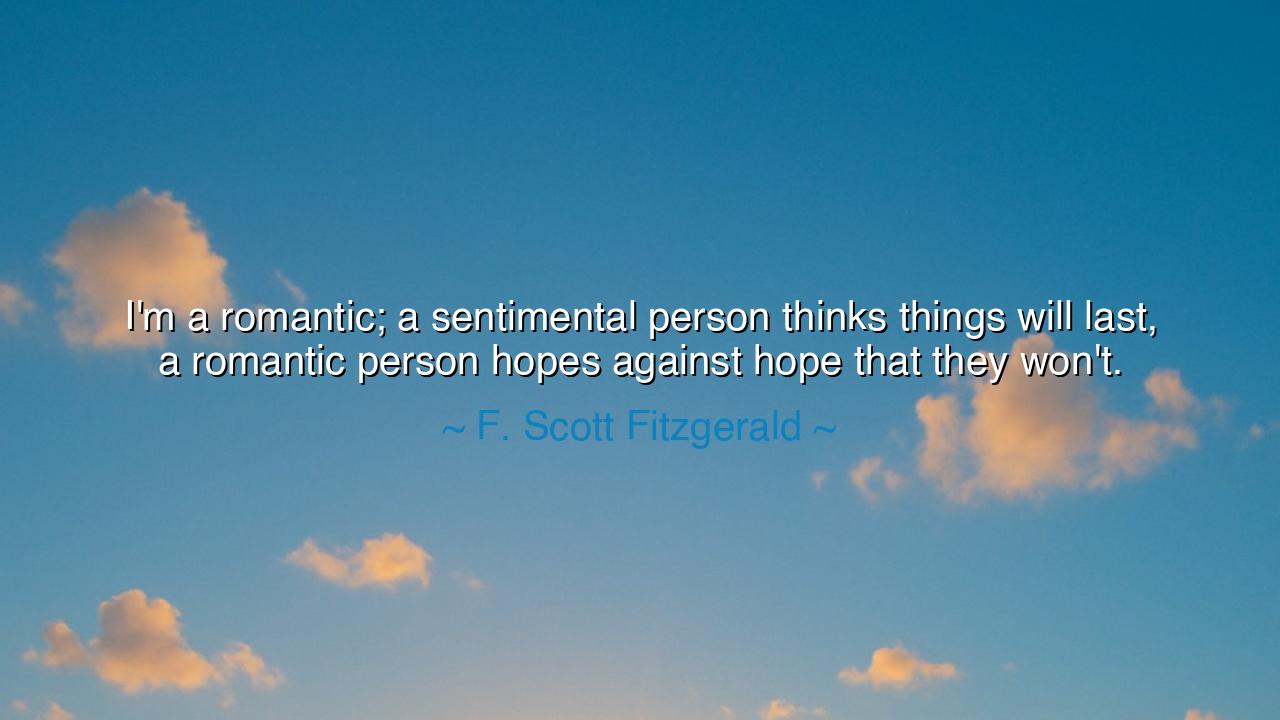
I'm a romantic; a sentimental person thinks things will last, a
I'm a romantic; a sentimental person thinks things will last, a romantic person hopes against hope that they won't.






“I’m a romantic; a sentimental person thinks things will last, a romantic person hopes against hope that they won’t.” So spoke F. Scott Fitzgerald, the poet of the Jazz Age, whose pen painted both the glitter and the grief of human longing. In these words lies the paradox of the romantic soul—the one who loves not because love endures, but because it fades; who finds beauty not in permanence, but in the fragility of the moment. The sentimental heart clings to what is passing, while the romantic heart bows to its impermanence and, in that surrender, discovers something deeper than possession—the holiness of loss itself.
Fitzgerald lived amid the roaring brightness of an age intoxicated by youth, beauty, and excess. Yet behind the champagne laughter, he saw the truth that every golden hour is shadowed by its coming twilight. His heroes—Gatsby, Daisy, and all who danced beneath the chandeliers of illusion—chased dreams that shimmered and vanished like sunlight on water. Fitzgerald himself knew that love burns brightest when it is doomed, that art is born from the ache of transience. Thus he wrote these words not as jest, but as confession: that to be romantic is to love the flame knowing it will consume itself, and to love it still.
To understand his meaning, we must journey into the realm of ephemeral beauty, where the ancient poets once walked. The Japanese spoke of mono no aware—the “pathos of things”—the quiet sadness in all that passes. The Greeks, too, sang of such awareness. Achilles, knowing his fate was sealed, still chose glory; for he understood that brevity magnifies beauty. So too does Fitzgerald’s romantic: he does not believe that things will last, but finds in their ending a kind of divine truth. He sees that only what dies can truly be loved, for love is the act of cherishing what time will take away.
Consider the fleeting life of John Keats, another romantic spirit. Knowing he was dying of consumption, he wrote poetry that trembled with the awareness of its own mortality. “Beauty is truth, truth beauty,” he said, as though to remind us that beauty’s truth lies in its passing. Keats loved the moment because it was fragile; Fitzgerald, centuries later, echoed that same wisdom. The sentimentalist wants the rose to never wither; the romantic loves it because it will. One clings in fear of loss; the other surrenders in awe of the inevitable.
Fitzgerald’s quote also reveals a deeper philosophy of life and art. The sentimental heart seeks comfort—it yearns for the illusion of forever. The romantic heart seeks meaning—it knows that forever is not given to mortals, but significance can be carved from the fleeting. The romantic therefore loves with open eyes, writes with trembling hands, and lives with the bittersweet awareness that each joy is already slipping away. Yet this awareness does not diminish life—it intensifies it. It turns every kiss, every dawn, every word into a sacred act.
In this way, Fitzgerald teaches that acceptance of impermanence is the root of true passion. To live romantically is to meet the world as it is—fleeting, uncertain, perishable—and still dare to love it with unguarded heart. It is to dance though the music will end, to build though the sea will reclaim, to create though time will erase. The sentimentalist hides from pain by pretending that nothing changes. The romantic grows wise by embracing that everything does.
The lesson, then, is clear: do not fear the passing of things—honor them for having been. Love fiercely, not because love will endure, but because it will not. Write, sing, embrace, and live with the tenderness of one who knows that each moment is a gift, not a guarantee. To live romantically is to bow before the mystery of time without bitterness, to say to the fading sunset, “You are more beautiful because you go.”
So, my listener, when you hold something precious—a friendship, a love, a dream—do not cling to make it last. Instead, be present enough to let it end with grace. For in the quiet courage of letting go, the romantic heart finds eternity not in duration, but in depth. Like Fitzgerald, hope not that life will stay unchanged, but that in its changing, you may awaken to the splendor of the moment, and say, before the curtain falls, “It was beautiful.”






AAdministratorAdministrator
Welcome, honored guests. Please leave a comment, we will respond soon